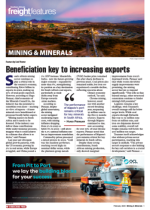Collaboration and beneficiation are the cornerstones of success in African mining. While the continent is open for business, it must be on Africa’s terms. This sentiment was echoed by several speakers at the recent Investing in African Mining Indaba in Cape Town.“We need a relentless focus on beneficiation and value addition right here in Africa,” said Mecktilder Mchomvu, executive director of Tanzania Women in Mining & Mineral Industry (TWiMMI). “The key to Africa’s mining future lies in African solutions for African challenges.”Speakers agreed that although the continent holds over 30% of the world’s mineral resources, much of it is exported as raw materials – only to be reimported at significantly higher costs. The consensus was clear: Africa must shift from being a supplier of ores to a producer of finished products, ensuring greater economic benefits remain within the continent.In an industry spotlight session, the contrast between Guinea and Australia in bauxite production highlighted the stark reality, as both nations have vast reserves, yet the outcomes are vastly different. The key difference? Africa continues to export raw bauxite, while Australia processes it into higher-value products.While the continent has some of the world’s best solar energy resources, it continues to import solar panels. “Why are we still importing rail tracks when we have the hybrid iron ore needed to manufacture them right here? It’s time to harness our own resources, invest in local manufacturing, and create industries that drive job creation and economic independence,” said a delegate attending a session chaired by Kwasi Ampofo, head of metals and mining at BloombergNEF.South African Minister of Mineral and Petroleum Resources, Gwede Mantashe, agreed, saying as the world’s richest mining jurisdiction, it was time for the continent to internalise that and use it to its advantage. “We have something that the world wants. We are not beggars. We must use that endowment for our own benefit as a continent.”Mentioning recent threats by the United States to withhold funding in response to certain African political policies, Mantashe said Africa should not be dictated to by industrialised nations. “They want to withhold funding, but they still want our minerals,” he said. “Let’s withhold minerals. Africa needs to assert its advantage and take charge of the growing demand.”He said South Africa held 37% of the world’s manganese ore reserves and led in manganese production, with an output of 7.2 million metric tonnes in 2023. Regrettably, only 2% of manganese ore was processed in the country, as estimated by the International Manganese Institute. “Cognisant of this reality and the fact that a lot of value is derived in the processing of these resources, we will this year intensify our engagements with the manganese producers and investors to invest in local beneficiation and thereby add value to these minerals,” he said.Mantashe added that the South African government, as well as its counterparts across the continent, realised that for local beneficiation to succeed, guaranteed, consistent, reliable and affordable electricity supply was necessary. “In South Africa I can say government is working on measures to reduce administered prices and in so doing reduce the cost of doing business in the country. We are also considering sustaining commodity-linked tariffs, as well as consolidating and applying incentives and other existing financial instruments to support and encourage beneficiation.”LV

